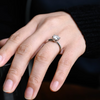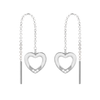The Conscious Consumer's Guide to Buying Sustainable Fine Jewelry
Embrace a Greener Love: Eco-friendly Valentine's Gifts
In an age where environmental awareness and ethical considerations are paramount, the jewelry industry is undergoing a transformation. Consumers are increasingly seeking sustainable fine jewelry as a way to align their purchases with their values. This shift has led to a growing interest in eco-friendly fine jewelry, ethical jewelry shopping tips, and sustainable jewelry brands that prioritize responsible practices. This guide is designed for the conscious consumer looking to make informed decisions about their fine jewelry investments, ensuring they contribute positively to the environment and society.
Understanding Sustainable Fine Jewelry
Sustainable fine jewelry encompasses pieces designed and crafted with environmental and ethical considerations at their core. This means using eco-friendly jewelry materials, ensuring that gemstones are ethically sourced, and employing environmentally friendly jewelry practices throughout the production process. The goal is to minimize the ecological footprint of jewelry while supporting fair labor practices and contributing to the wellbeing of mining communities.
Conscious Jewelry Consumption
Conscious jewelry consumption starts with understanding the impact of jewelry production on both the environment and people. It involves choosing pieces from brands that are committed to reducing harmful practices, recycling materials, and ensuring the ethical treatment of workers. By becoming a more informed consumer, you can help drive demand for sustainable luxury jewelry and encourage more brands to adopt responsible practices.
Ethical Jewelry Shopping Tips
When shopping for sustainable fine jewelry, consider the following tips to ensure your purchases align with your ethical and environmental values:
- Research Brands: Look for sustainable jewelry brands that transparently share their sourcing and manufacturing processes. Brands that are certified by reputable organizations, such as the Responsible Jewellery Council, are often a good choice.
- Ask About Sourcing: Inquire about the origins of gemstones and metals. Ethically sourced gemstones and recycled metals significantly reduce the environmental impact of jewelry.
- Consider the Full Lifecycle: Think about the entire lifecycle of the jewelry piece, from sourcing to production, and even end-of-life recycling options. Sustainable jewelry brands often offer programs for recycling or repurposing old jewelry.
Sustainable Jewelry Brands
A key aspect of responsible jewelry purchasing is supporting brands that prioritize sustainability in their design and manufacturing processes. These brands often use recycled materials, ethically sourced gemstones, and employ artisans under fair labor conditions. By choosing to buy from these brands, consumers can support the growth of sustainable practices in the industry.
Green Fine Jewelry Choices
Making green fine jewelry choices involves opting for pieces that have a minimal environmental impact. This can include jewelry made from recycled or reclaimed metals, lab-grown diamonds, and gemstones from mines that adhere to strict environmental and ethical standards. Such choices not only reduce harm but also promote the use of renewable resources and energy-efficient production methods.
Eco-Conscious Jewelry Investments
Investing in eco-conscious jewelry means selecting pieces that are timeless, versatile, and made to last. High-quality, sustainable fine jewelry can be a lifelong investment that retains its value both financially and ethically. Consider classic designs that won't go out of style and can be passed down through generations as heirlooms.
Ethically Sourced Gemstones
Ethically sourced gemstones are those that are mined and sold following principles that prioritize the welfare of workers, communities, and the environment. This includes ensuring fair wages, safe working conditions, and minimizing environmental degradation. When buying fine jewelry, ask for documentation or certification that verifies the ethical sourcing of gemstones.
Environmentally Friendly Jewelry Practices
Environmentally friendly jewelry practices encompass a broad range of activities, from using non-toxic processes in jewelry making to implementing water conservation measures and reducing carbon emissions. Brands that are committed to these practices will often share details about their efforts to minimize their environmental impact.
Guide to Buying Sustainable Diamonds
When looking to purchase sustainable diamonds, consider lab-grown options or diamonds certified by organizations like the Kimberley Process, which aims to prevent the sale of conflict diamonds. Lab-grown diamonds offer a less environmentally damaging alternative, as they require no mining and have a significantly lower carbon footprint.
Sustainable Luxury Jewelry
Sustainable luxury jewelry combines the allure of fine jewelry with the principles of sustainability. This segment of the industry is growing, as more luxury brands recognize the importance of sustainability and incorporate eco-friendly materials and ethical practices into their collections.
Ethical Fine Jewelry Trends
Keeping an eye on ethical fine jewelry trends can help consumers stay informed about new and innovative ways the industry is becoming more sustainable. This includes advancements in lab-grown gemstones, the use of alternative materials, and the rise of transparency and traceability in the supply chain.
Eco-Friendly Jewelry Materials
Eco-friendly jewelry materials are those that are either recycled or responsibly sourced in a way that minimizes environmental impact. This can include recycled gold and silver, lab-grown gemstones, and alternative materials that offer sustainable options without compromising on quality or beauty.
Sustainability in Jewelry Design
Sustainability in jewelry design is about more than just materials; it's also about crafting pieces in a way that considers the long-term impact on the environment and society. This includes designing for durability, using production methods that conserve resources, and creating pieces that can be easily recycled or repurposed at the end of their lifecycle.
Responsible Jewelry Purchasing
Responsible jewelry purchasing is an integral part of being a conscious consumer. It involves making choices that support ethical labor practices, reduce environmental harm, and contribute to positive social impacts. By choosing to purchase sustainable fine jewelry, consumers can play a part in promoting a more responsible and sustainable jewelry industry.
Conclusion
As the demand for sustainable and ethical products continues to grow, the jewelry industry is responding with more transparent and responsible practices. For conscious consumers, the journey towards buying sustainable fine jewelry involves research, asking the right questions, and making choices that align with their values. By prioritizing eco-friendly fine jewelry, ethical sourcing, and supporting sustainable brands, consumers can enjoy beautiful, high-quality jewelry while contributing to a more sustainable and ethical world. Whether you're looking for an engagement ring, a statement piece, or something for everyday wear, remember that your purchasing decisions have the power to influence the industry towards a more sustainable future.












